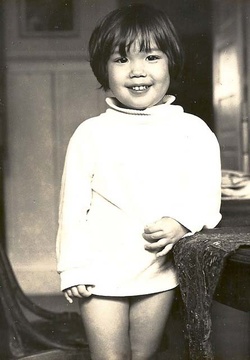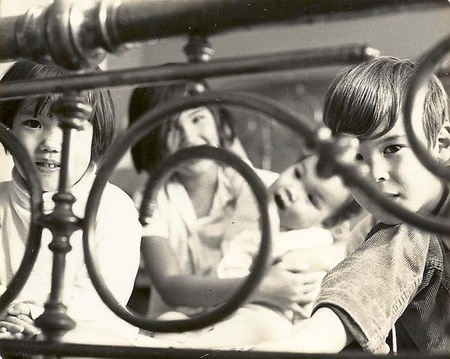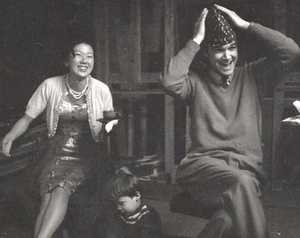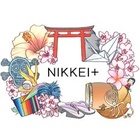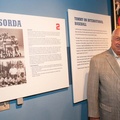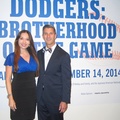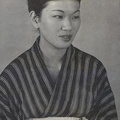As a Japanese-Jewish American girl, I have suffered.
It’s not just that both of my tribes were placed in camps because they were simply born, or perhaps hated for being smart, bold, different, and even oddly wonderful.
As a Jew, I am reminded continually that I am lucky to be alive, part of the chosen, and should I kvetch about my standing in life, may God burn me like a self-burning bush—and one that isn’t even on sale.
And as a Japanese woman, I have been taught from an early age that suffering is in fact a divine art to be lived daily, and part of a quiet, grueling task of life that we all must endure silently.
While I am still sane enough to consciously write this, I feel a sudden urge to ponder some quotes from my people that actually make sense.
“You can live to be a hundred if you give up all the things that make you want to live to be a hundred.”
Woody Allen said that.
That’s right, the intellectual, self-proclaimed social neurotic of our time has more than a few choice words of good advice if you can get past the Soon Yi-Mia Farrow incident.
On the other hand—he wisely commented, “I’m astounded by the people who want to know the universe when it’s hard enough to find your way around Chinatown.”
I can relate to that one.
However, in my household while growing up, going to Chinatown was not necessary if one wanted to feel lost or have fear.
I lived in a house of neurosis and fear as my parents actually told me there was no such thing as having an accident, having children not included.
Double the guilt-a-fish is what I got.
Let’s just say that I grew up thinking that “While Jesus was a suffering member of my tribe I was not allowed to worship”…
Buddha said, “Life as we know it ultimately leads to suffering.”
You see, I couldn’t win.
I will never forget getting that shiny red Schwinn bicycle I got for HannuChrist, our combination of Hannukah and Christmas.
I was only allowed to ride it within a four-foot area of our family patio as my parents feared I might die from being too happy.
Eventually my older brother took it apart one summer and made it into an art piece—yet another genius! He is an accomplished sculptor who today is known for welding metal and chrome into moving robots with knives—talk about not having fear!
He shows me his scars during Thanksgiving just for fun.
I remember once being told by my mother that “any harmful outcome” could be avoided if I was only careful enough and smart enough.
And yes, I did manage to avoid too many years of psychotherapy, even though I was accident prone and harmed myself on a daily basis.
My cultural confusion can be summed up in this anonymous quote—“There is no escaping karma. In a previous life, you never called, you never wrote, you never visited. And whose fault was that?”
Until recently I believed “everything” was my fault.
All kidding not aside, after years of bumping into walls, breaking dishes and even nailing my own finger into a two-by-four, I realized I was still alive!
I also knew that I had missed out on crazy excursions like inventing my own romance languages or making friends with the bum in town that walked in circles just like I rode my bicycle.
I still have nightmares of going in circles for infinity on that Schwinn. Of course the dream also involves a Spanish dwarf, pumpkin pie, and Newt Gingrich’s wife—but don’t worry, I plan to speak with my Jungian analyst about that next week.
As I discovered this epiphany, relief and the realization of how many great years I may have missed out on… I cannot say that today I live a necessarily safe life…but definitely a more exciting life, despite breaking coffee cups, my nose, or a tchotchke once an hour.
In order to fearlessly go where perhaps not many Japanese Jews venture, I say to myself…
“Self, a few accidents never hurt anyone,” as I attempt risky endeavors which includes wild escapades such as racing motorcycles while naked or reading too much history about the Cossacks, two things my mother cautioned were extremely dangerous.
I have however avoided blatant dangers such as swimming with sharks or learning how to play Beethoven’s Fifth on the bassoon. I can also say without much medication thus far that I have faced life with great fervor, and sometimes even with a fever.
My life story can be summed up best in the following quote…
“Let your mind be as a floating cloud. Let your stillness be as the wooded glen. And sit up straight. You’ll never meet the Buddha with posture like that.”
Becoming a parent has also given me a different perspective on the subject, leaving me sympathetic to my mother’s cause and curse.
With my first child I woke her as a newborn each hour just to hear her cry so that I could be sure she was still alive. Let’s just say that continual breastfeeding replaced roller skating as my favorite sport.
I suddenly found that with parenthood, I too feared accidents around each corner, even though I hardly left the house, except to take her to the doctor—once a day.
Even worse, I instilled this fear in my first child; worrying incessantly that she was too cold, too hot, getting too much sleep or not enough…it never ended. And I wonder today why she needs space from me.
I suppose this is what I could expect from being raised by a Russian-Jewish father raised in Beverly Hills, and a Japanese mother raised on farmlands in Hawaii.
And you think you have issues? Let’s just say that my weekends weren’t exactly filled with parties of “Mazeltov” over luxurious plates of lox and sushi.
Try guilt-ridden bagels and raw barrels of fish I had to clean. Oy Vehish!
I am reminded of two quotes I heard as a child, one from a Japanese emperor—“Generally speaking, the way of the warrior is the resolute acceptance of death”…
And the other from Woody Allen—“It’s not that I’m afraid to die, I just don’t want to be there when it happens.”
And at least I have the courage to admit, “Yes, I come from a long line of Worriers,”…but I have now changed my family tune and consider myself a “Warrior” instead.
After all, Samurais as well as Deli owners run in my blood. Don’t you remember John Belushi’s Samurai Delicatessen?
No twelve steps about it, in one fell swoop, I’m attempting to take the “fear of accident gene” out of my DNA.
And I am proclaiming that diving into the pool of life is where it’s at—hopefully without sharks in the water, with a life raft, a friend who knows CPR, and a warm towel nearby.
Admittedly, having daughters can make you want to draw up plans to build a bomb shelter and only hope for rescue. But alas, the rescue never comes, except in the realization that a life is only worth living if lived freely from one’s own fears, dangers and all.
Mark Twain once said, “Accident is the name of the greatest of all inventors.” Parents can choose to be an inspiration, ailment, or some mentor in between when it comes to a child’s adventuresome spirit lasting through adulthood.
And for some strange reason, I also thought of the following quote by Art Buchwald, “The buffalo isn’t as dangerous as everyone makes him out ot be. Statistics prove that in the United States, more Americans are killed in automobile accidents than are killed by buffalo.”
This brings to mind that my mother doesn’t drive because she thinks it is too dangerous. Come to think of it we never had a buffalo roaming the house when we were kids either.
Buchwald’s words are music to my ears, because now I know that buffalos aren’t nearly as dangerous as I might have thought after all.
And for those of us who now prefer to roam the wild blue yonder rather than stay inside, this is a good thing.
*This article was originally published on Francesca Biller’s blog, Funny Girl with a Serious Attitude, on September 18, 2013.
© 2013 Francesca Biller


